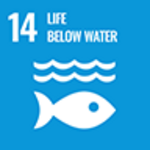
In recent years, significant progress has been made in combating climate change both domestically and internationally. The Sustainable Development Goals (SDGs) also specify climate change countermeasures as one of the 17 goals. The Japanese government has declared that it aims to realize a decarbonized society by 2050. In order to foresee the future and implement effective countermeasures, it is extremely important to conduct research on climate change prediction using cutting-edge science and technology, and to evaluate the impact of climate change on the earth's ecosystems. The Ministry of Education, Culture, Sports, Science and Technology has adopted the ``Integrated Climate Model Advancement Research Program,'' a project in which 13 institutions in Japan, including our university, collaborate to further promote climate change research and apply its results to society. Hokkaido University is primarily involved in assessing the impact of climate change on marine and terrestrial ecosystems, as well as making recommendations for ecosystem management.
PEPS (Progress in Earth and Planetary Science) special issue:
Preface to “Prediction and Impact Assessment of Global Climate Change”
Preface for “Projection and impact assessment of global change”
Introducing examples of SDGs initiatives by JST:
Creation of climate change prediction information that forms the basis of climate change countermeasures
Hokkaido University Press Release:
<June 15, 2021> The effects of global warming, acidification, and oxygen depletion on the Hokkaido coastal area are revealed
<September 15, 2020> Typhoons with heavy rain increase the risk of forest collapse
<August 26, 2020> Evaluating the impact of information provision on awareness of cooperation in environmental conservation
<August 22, 2018> “Tropicalization” of ecosystems: The world’s first elucidation of the mechanism by which seaweed beds are replaced by coral communities in temperate zones




















